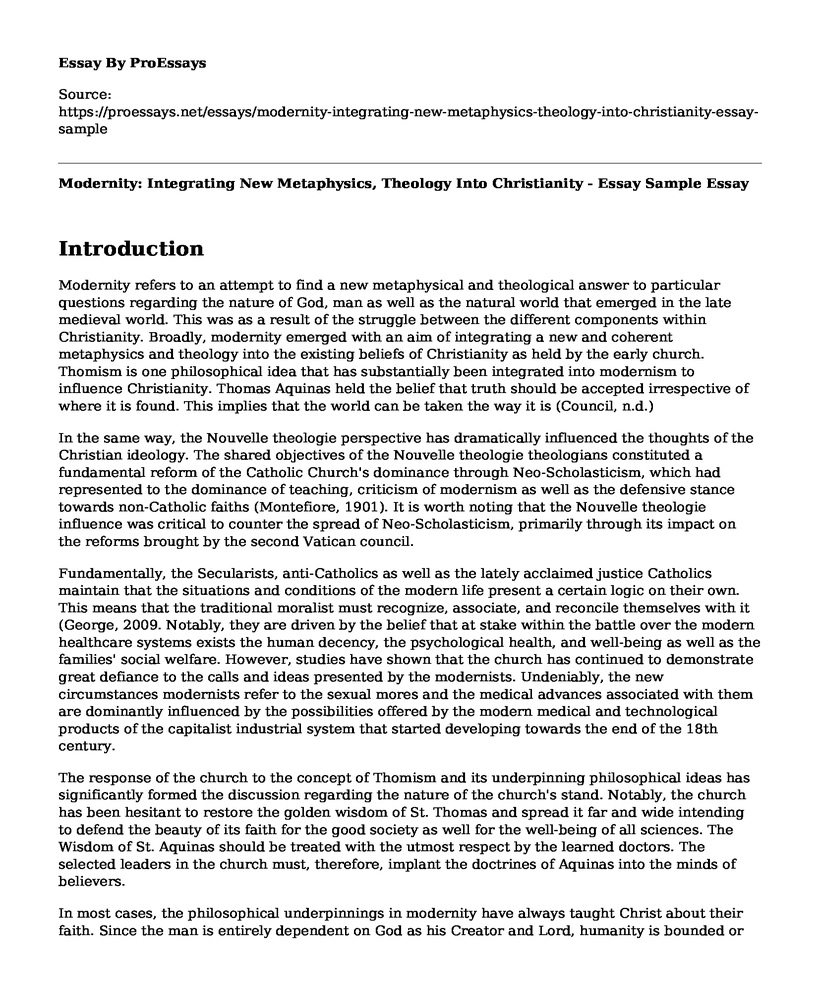Introduction
Modernity refers to an attempt to find a new metaphysical and theological answer to particular questions regarding the nature of God, man as well as the natural world that emerged in the late medieval world. This was as a result of the struggle between the different components within Christianity. Broadly, modernity emerged with an aim of integrating a new and coherent metaphysics and theology into the existing beliefs of Christianity as held by the early church. Thomism is one philosophical idea that has substantially been integrated into modernism to influence Christianity. Thomas Aquinas held the belief that truth should be accepted irrespective of where it is found. This implies that the world can be taken the way it is (Council, n.d.)
In the same way, the Nouvelle theologie perspective has dramatically influenced the thoughts of the Christian ideology. The shared objectives of the Nouvelle theologie theologians constituted a fundamental reform of the Catholic Church's dominance through Neo-Scholasticism, which had represented to the dominance of teaching, criticism of modernism as well as the defensive stance towards non-Catholic faiths (Montefiore, 1901). It is worth noting that the Nouvelle theologie influence was critical to counter the spread of Neo-Scholasticism, primarily through its impact on the reforms brought by the second Vatican council.
Fundamentally, the Secularists, anti-Catholics as well as the lately acclaimed justice Catholics maintain that the situations and conditions of the modern life present a certain logic on their own. This means that the traditional moralist must recognize, associate, and reconcile themselves with it (George, 2009. Notably, they are driven by the belief that at stake within the battle over the modern healthcare systems exists the human decency, the psychological health, and well-being as well as the families' social welfare. However, studies have shown that the church has continued to demonstrate great defiance to the calls and ideas presented by the modernists. Undeniably, the new circumstances modernists refer to the sexual mores and the medical advances associated with them are dominantly influenced by the possibilities offered by the modern medical and technological products of the capitalist industrial system that started developing towards the end of the 18th century.
The response of the church to the concept of Thomism and its underpinning philosophical ideas has significantly formed the discussion regarding the nature of the church's stand. Notably, the church has been hesitant to restore the golden wisdom of St. Thomas and spread it far and wide intending to defend the beauty of its faith for the good society as well for the well-being of all sciences. The Wisdom of St. Aquinas should be treated with the utmost respect by the learned doctors. The selected leaders in the church must, therefore, implant the doctrines of Aquinas into the minds of believers.
In most cases, the philosophical underpinnings in modernity have always taught Christ about their faith. Since the man is entirely dependent on God as his Creator and Lord, humanity is bounded or obliged to offer full obedience to Him. However, the Catholic Church has provided a profession that this faith which is the beginning of human salvation is a supernatural virtue through which humanity believes that things God reveals are right (Pio, 1907). Such belief is further hinged on the fact that God is the authority who cannot be deceived or deceive his people. Faith is, therefore, a substance thing that must be hoped for and thus constitute the evidence of words that appear or not.
Conclusion
In conclusion, modernity emerged to integrate a new and coherent metaphysics and theology into the existing beliefs of Christianity as held by the early church. This was as a result of the struggle between the different components within Christianity. About Thomism for instance, the church has been hesitant to restore the golden wisdom of St. Thomas and spread it far and wide intending to defend the beauty of its faith for the good society as well for the well-being of all sciences.
References
Council, F. V. Dei Filius (Dogmatic Constitution on the Catholic Faith). Decrees of the Ecumenical Councils, 2. http://inters.org/Vatican-Council-I-Dei-Filius
George, T. (2009). Autobiography and Life of George Tyrrell. BiblioBazaar, LLC.
Leo, P. (1900). Aeterni patris. The Papal Encyclicals, 17-27. http://w2.vatican.va/content/leo-xiii/en/encyclicals/documents/hf_l-xiii_enc_04081879_aeterni-patris.html
Montefiore, C. G. (1901). ABBE LOISY'S" ETUDES BIBLIQUES.". Jewish quarterly review, 1888-1891, 14, 147-158.
Pio, X. (1907). Pascendi dominici gregis. Acta Sanctae Sedis, 40. http://w2.vatican.va/content/pius-x/en/encyclicals/documents/hf_p-x_enc_19070908_pascendi-dominici-gregis.html
Cite this page
Modernity: Integrating New Metaphysics, Theology Into Christianity - Essay Sample. (2023, Feb 24). Retrieved from https://proessays.net/essays/modernity-integrating-new-metaphysics-theology-into-christianity-essay-sample
If you are the original author of this essay and no longer wish to have it published on the ProEssays website, please click below to request its removal:
- Understanding the Phenomenon of Islamic Charity in the Islamic World and Beyond
- Free Will, God, and Evil in Philosophy Essay Example
- Axiology Essay Example
- Essay Sample on the Genre of Gospel in the New Testament
- Essay on Buddhism and Daoism: Solving Social Issues Through Spiritual Practice.
- Essay Sample on The Image of God: Man's Dominion, Freedom, and Unity
- Response to the Article "Consecrated Counseling"







